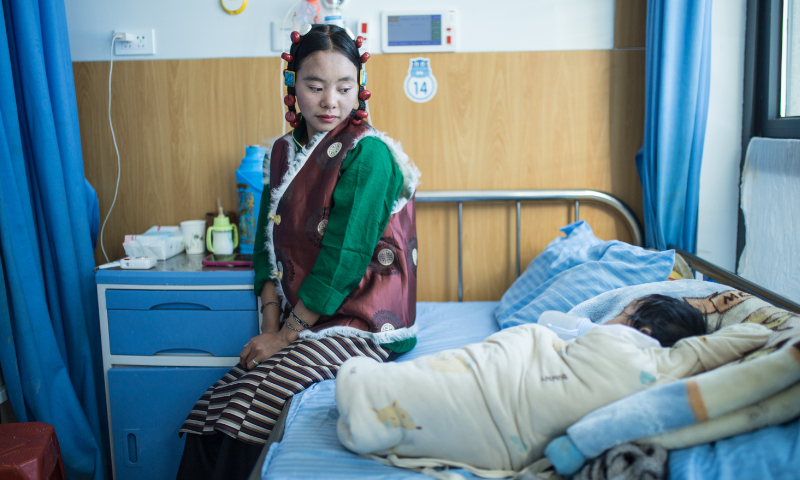Residents in remote, harsh high-altitude region of Xizang enjoy guaranteed medical care

A hospital located at an altitude of 4,500 meters in Southwest China's Xizang Autonomous Region has become a shelter for the local people, granting them access to guaranteed medical services, largely thanks to the assistance provided by the central government, reflecting China's efforts to protect human rights.
Nagqu People's Hospital as a high-altitude hospital faced challenges such as its remote location and harsh climate, as well as problems of attracting and retaining highly skilled medical professionals. Thankfully, the sixth group of medical experts dispatched by Northeast China's Liaoning Province continue to prioritize improving medical technology, enhancing service capabilities, and cultivating a team of medical professionals who will remain in the region.
On Friday, the Global Times witnessed the orderly operation of the hospital: children with their parents resting in clean and spacious rooms; premature infants were being cared for by specialist nurses in advanced incubators; in the gastroenterology department on the ground floor, people lined up orderly, waiting for endoscopic examinations.
Since 2015, Liaoning Province has dispatched a total of 116 experts to assist Xizang, providing strong support for the high-quality development of medical services in Nagqu. Additionally, Liaoning Province has invested over 20 million yuan ($2.7 million) for the purchase of equipment such as magnetic resonance imaging and telemedicine platforms to aid in the hospital's development. Currently, critical care units for maternal and child health, pediatric critical care, high-altitude medical research center, and emergency rescue have all been established.
Nagqu People's Hospital has developed an innovative new model, tailoring achievable and sustainable goals based on the local common diseases and departmental development needs to ensure that both the assisting and receiving parties work together to achieve targeted assistance, Jia Zhuqiang, the hospital's director and a doctor from the First Affiliated Hospital of Dalian Medical University, told the Global Times.
The hospital has also selected a group of skilled staff to be trained as teaching candidates. Training takes place through methods like "teachers and apprentices," according to Jia.
For instance, Angzhen, a gastroenterologist, learned a lot from Wu Pubin, a doctor from Dalian to assist Nagqu. "I am very grateful for this opportunity to learn new techniques and improve my skills from experienced doctors," Angzhen told reporters.
During the Global Times' visit to the facility which first opened in 2021, a young mother from Nagqu's Lhari County was receiving treatment for her nine-month-old baby for pediatric pneumonia on the fifth floor at the hospital. "We traveled for four or five hours to get here, and my child was quite unwell when we arrived." Fortunately, after a few days of treatment, her child is well on the path to recovery.
The mother mentioned that her baby was also born in the hospital, and the medical conditions have significantly improved since the baby was delivered.
"In the past, local herders did not have the habit of giving birth in hospitals, but now people are more willing to come to the hospital because it is safer, more reliable, and more hygienic. People also have a lot of trust in the hospital," said Zhao Yi, the director of the obstetrics and gynecology department at the Nagqu People's Hospital, who is also a doctor from Liaoning.
Nagqu is located in northern Xizang, deep within the Qinghai-Xizang Plateau, and is a crucial area covering the country's western border security and a strategic support point. It serves as the "North Gate" of Xizang and a major crossroads for land transportation in the entire region.
Nagqu is also the highest-altitude prefecture-level city in the country, with the harshest environmental conditions and the most demanding conditions for local residents. The average elevation in the city is 4,500 meters, and the oxygen content in the air during the summer is only 58 percent of that at sea level. The annual average temperature ranges from -0.9 C to -3.3 C.